Connolly, Burnham, Orwell, & “Corner Table”
“In the torture scenes, he is merely melodramatic: he introduces those rather grotesque machines which used to appear in terror stories for boys.”
—V. S. Pritchett, The New Statesman [2], June 18, 1949
The torture section in Nineteen Eighty-Four[1] [3] was planned from the beginning, and intended to be the story’s core and culmination. The key influence here was James Burnham’s The Struggle for the World (discussed below), which George Orwell reviewed in March 1947, shortly before starting the first full longhand draft of the new novel. In Struggle, Burnham emphasized the likelihood of another World War within another few years, and probably even a war using the “atomic bomb.”
This found its way into Nineteen Eighty-Four, as did Burnham’s analysis of Communism (though Orwell didn’t call it that). Terror, torture, disinformation, humiliation: these are not unfortunate byproducts of Communist revolution, said Burnham, they are the system itself.
The original model for Nineteen Eighty-Four wasn’t as grim as that. It was frivolous, really, and written years and years before the Cold War was dreamt of. It was a little black comedy that used torture strictly for laughs. Titled “Year Nine,” Cyril Connolly dashed it off at the end of 1937.[2] [4] It appeared in The New Statesman in January 1938.
It’s a brief farce, less than two thousand words, yet in there are prefigured Big Brother, the Thought Police, Newspeak, and the Ministry of Love. To tell a brief story briefly: After happening upon a basement art exhibit, the narrator – an assembly-line envelope-flap-licker – is accused of thoughtcrime (approximately). He is arrested, severely tortured, and sentenced to excruciating execution.
Orwell was much impressed with it, and so were John Betjeman and others.[3] [5] Up to this point, Connolly was known mainly as an idler and failed novelist. Very soon, though, he published a memoir, Enemies of Promise, founded Horizon (“A Review of Literature & Art”), became editor of The Observer‘s book section (where he farmed out reviews to Orwell and Evelyn Waugh and Arthur Koestler), and was generally London’s number-one all-’round critic and litterateur.
From “Year Nine”:
As the hot breath of the tongs approached, many of us confessed involuntarily to grave peccadilloes. A man on my left screamed that he had stayed too long in the lavatory.
* * *
Our justice is swift: our trials are fair: hardly was the preliminary bone-breaking over than my case came up. I was tried by the secret censor’s tribunal in a pitchdark circular room. My silly old legs were no use to me now and I was allowed the privilege of wheeling myself in on a kind of invalid’s chair. In the darkness I could just see the aperture high up in the wall from whence I should be cross-examined . . .
Our narrator (not a Winston Smith type, more of a garrulous Connolly/O’Brien) is sentenced to be “cut open by a qualified surgeon in the presence of the State Augur.”
“You will be able to observe the operation, and if the Augur decides the entrails are favourable they will be put back. If not, not . . . For on this augury an important decision on foreign policy will be taken. Annexation or Annihilation? . . .
Yes, I have been treated with great kindness.[4] [6]
There is a cultural time-stamp on “Year Nine,” clearly visible. The Moscow Purge Trials were underway and widely known about, but Connolly pins the Stalinist outrages in his tale – torture, forced confessions, anonymous denunciations – upon a cartoonish pseudo-Nazi regime, complete with Stroop Traumas, Youngleaderboys, and a population in thrall to Our Leader. (Connolly hadn’t a political bone in his body, but he posed as a Fellow Traveler, that being comme il faut.)
Conversely, when Nineteen Eighty-Four came out in 1949, it too drew on the Moscow Trials, and no one questioned (least of all Pravda) that Orwell was depicting a Soviet-style police-state. This happened even though Orwell slyly denied that it was about Communism. You can see this in the novel’s own disclaimers, and in external press releases that author and publisher sent out.
A curious legacy of “Year Nine” is that its Punch-and-Judy brilliance shines through the surface narrative of Nineteen Eighty-Four, giving the torture scenes a lurid “vaudeville” feel. Orwell probably didn’t intend the scenes in the Ministry of Love (Miniluv) to be black comedy, but that’s what he got, from O’Brien’s jabberwocky speeches, all the way to the rats in the cage-mask. (“‘It was a common punishment in Imperial China,” said O’Brien as didactically as ever.’”)
Lord of Chaos
Connolly/O’Brien is your emcee and Lord of Chaos in the Miniluv torture clinic. This is far from the standar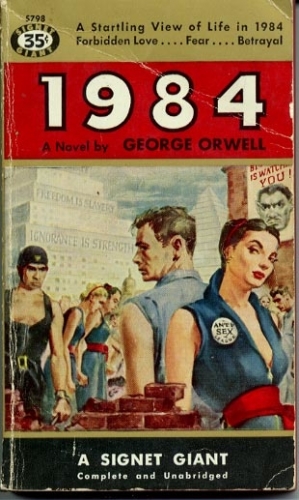 d crib-note interpretation of O’Brien (“zealous Party leader . . . brutally ugly”), but pray consider: a) Connolly was Orwell’s only acquaintance of note who came close to the novel’s description of O’Brien, physically and socially; b) if you bother to read O’Brien’s monologues in the torture clinic, you see he’s doing a kind of Doc Rockwell routine: lots of fast-talking nonsense about power and punishment, signifying nothing.
d crib-note interpretation of O’Brien (“zealous Party leader . . . brutally ugly”), but pray consider: a) Connolly was Orwell’s only acquaintance of note who came close to the novel’s description of O’Brien, physically and socially; b) if you bother to read O’Brien’s monologues in the torture clinic, you see he’s doing a kind of Doc Rockwell routine: lots of fast-talking nonsense about power and punishment, signifying nothing.
This is one reason why O’Brien fails as a villain. Villains must be monolithic. Here we have an Inner Party exemplar-cum-old Etonian who still boasts of his “antinomian tendencies” – a humorist and parodist, author of The Theory and Practice of Oligarchical Collectivism as well as “Where Engels Fears to Tread”;[5] [8] in short, a louche Fellow-Traveler-of-convenience, renowned for self-indulgence and amorality. And thus he fits right in with what O’Brien tells us about the Inner Party ethos (do read the monologues): someone who’s amoral, capricious, and power-hungry (and a potential sociopath, if O’Brien’s description of the Party’s lust for power is anything to go by).
* * *
If Orwell wanted to put Connolly out of his mind while working on Nineteen Eighty-Four, he couldn’t, because he was forever revising an essay-memoir about the school they went to together between 8 and 14. It was the most miserable time of life for young Eric Blair (for such he was). He had probably started this memoir in the early 1940s, and still had the unpublished typescript with him in London when he was playing with notes and abortive chapters for his projected novel in 1945 and 1946. And then he brought it with him to the Isle of Jura, Inner Hebrides, in the spring of 1947, where he finally began to handwrite the first draft of The Last Man in Europe (as he was then calling the Winston Smith novel). He also revised the memoir, sending a carbon to his publisher in late May. Then, in 1948, when he was laid up with TB in a hospital near Glasgow and struggling to rewrite the novel with his writing arm in a cast, he revised the memoir yet again. It wouldn’t be published in Great Britain until 1967.
The memoir was Cyril Connolly’s idea. Connolly had put his fond-but-unnerving school memories into Enemies of Promise (which made him famous), and suggested his old schoolmate Blair might do the same: a companion piece or “pendant” to Connolly’s sardonic memoir. So Blair/Orwell decided to do a Dickens about his time as an upper-middle-class poor boy at St. Cyprian’s, enduring six years of oppression, humiliation, and petty tortures. He attended the school on reduced fees (as the Headmaster’s wife reminded him loudly and often) because he was expected to win a scholarship to Eton, and so bring glory and honor to St. Cyprian’s. From age 11 onward, Young Blair was “crammed with learning as cynically as a goose is crammed for Christmas” (as he wrote), mainly Latin and Greek.
This is the nearest thing to an autobiography we ever got out of Orwell, and the disgusted, sulky, sharp-eyed loner we see in his essays and Winston Smith is thoroughly recognizable as the boy at St. Cyprian’s. To make himself seem even lonelier and more miserable – or perhaps for some other motive – he cut Cyril Connolly entirely out of story.
At one point in the memoir, Orwell pulls back and says he doesn’t mean to suggest his school was a kind of Dotheboys Hall. Then he marches off again and tells us about the filthy lavatories and disgusting food, and how he once saw a human turd floating on the surface of the local baths in Eastbourne. On finally leaving St. Cyprian’s – off to Eton, but first a term at Wellington – he looked to the future with despair. “[T]he future was dark. Failure, failure, failure – failure behind me, failure ahead of me . . .”
Orwell’s publisher and friends thought the memoir was just too embarrassing and self-pitying to publish. It would be bad for Orwell’s reputation, they said, and probably libelous. So the perennial work-in-progress didn’t see the light of day until Orwell was safely dead and Partisan Review in New York ran a slightly altered version in their September-October 1952 issue. It ran for 41 pages, called St. Cyprian’s “Crossgates,” and used Orwell’s title: “Such, Such Were the Joys.”[6] [9]
* * *
You sometimes hear that Orwell plagiarized from another dystopian story, usually one set many centuries in the future, with little or no resemblance to Orwell’s. In 2009, on Nineteen Eighty-Four‘s sixtieth anniversary of publication, Paul Owen in The Guardian tried to make the case that Orwell “pinched the plot” from Yevgeny (or Eugene) Zamyatin’s early-1920s novel, We.[7] [10] As evidence, Owen says that Orwell read Zamyatin’s book three years before Nineteen Eighty-Four was published (1949). This is a lie by misdirection. Orwell had been making notes and outlines since at least 1944, and finished his first draft in 1947. He first heard of Zamyatin’s book in 1943, failed to find a copy of the 1920s English translation published in New York,[8] [11] and finally settled for a French one, his review appearing in early 1946.[9] [12] Owen’s biggest claim is completely wrong: “that Orwell lifted that powerful ending – Winston’s complete, willing capitulation to the forces and ideals of the state – from Zamyatin.” The ending of Nineteen Eighty-Four is in fact a retread of a novel ending that Orwell wrote in 1935.
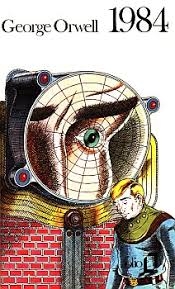 A good deal of Nineteen Eighty-Four, in fact, is a twisted retelling of Keep the Aspidistra Flying.[10] [13] Orwell wrote Aspidistra in 1935 during his Hampstead bookshop-assistant days, and was ever after ashamed of it. Never mind, it’s a beautiful piece of pathetic self-mockery, giving us a 1930s-model Winston Smith. Instead of surrendering to Big Brother at the end, the Winston-figure, Gordon, finally sells out to the “Money God” – and goes back to his job as an advertising copywriter. A happy ending, strangely enough.
A good deal of Nineteen Eighty-Four, in fact, is a twisted retelling of Keep the Aspidistra Flying.[10] [13] Orwell wrote Aspidistra in 1935 during his Hampstead bookshop-assistant days, and was ever after ashamed of it. Never mind, it’s a beautiful piece of pathetic self-mockery, giving us a 1930s-model Winston Smith. Instead of surrendering to Big Brother at the end, the Winston-figure, Gordon, finally sells out to the “Money God” – and goes back to his job as an advertising copywriter. A happy ending, strangely enough.
In place of glowering Big Brother posters, Gordon is surrounded by vast images of “Corner Table,” a “spectacled rat-faced clerk with patent-leather hair,” grinning over a mug of Bovex. (Presumably Bovril + Oxo.) “Corner Table enjoys his meal with Bovex,” shouts the poster all over town. Everywhere Gordon is stared down by the Money God, in the guise of advertisements on all the hoardings. “Silkyseam – the smooth gliding bathroom tissue.” “Kiddies clamour for their Breakfast Crisps.”
Like Winston, Gordon is under constant surveillance at home (from his landlady) and takes his girlfriend out to the countryside, where they have sex on the wet ground. When he gets in trouble with the law, he wakes up in a jail with walls of “white porcelain bricks,” like the lockup at Miniluv. His O’Brien-analogue, an upper-class literary friend and little-magazine publisher named Ravelston, shows up and rescues him from the clink. Instead of taking him to a torture chamber, he puts Gordon up in his flat and gently badgers him to straighten out his life, which Gordon does eventually, but not just yet. Torture was different in the Thirties.
* * *
Connolly’s “Year Nine” provided an amusing, pocket-sized framework for building a terror-regime satire, while Keep the Aspidistra Flying gave the naturalistic “human” elements to be restyled for Nineteen Eighty-Four. The new novel also needed serious geopolitical underpinnings, and here Orwell leaned heavily on James Burnham. It’s long been known that Orwell took the “three super-states” idea from Burnham’s The Managerial Revolution (1941).[11] [14] Orwell and his publisher cited Burnham and that book when they wrote a press release in June 1949, explaining what Nineteen Eighty-Four was “about.” (Press interest was intense, and the hat-tip to Burnham looks suspiciously like a red herring.)
Burnham’s “three super-states” schema was the inspiration not only for Oceania-Eurasia-Eastasia, but most probably the entire novel; it was like a piece of grit in the oyster, waiting for the pearl to form around it. It became Orwell’s pet geopolitical concept, and from 1944 onward we find him continually dropping mentions of “three super-states” in his reviews, articles, and columns.
[15]Nevertheless, it was a later book by Burnham, The Struggle for the World (1947)[12] [16] that really gave Nineteen Eighty-Four its horror and worldview. Here, Burnham argued that another World War was likely soon (say, 1950), and something nuclear would probably be in play. This provided the backstory to Oceania’s murky history of war and revolution, along with some early memories for Winston Smith. An “atomic bomb” – as we called them then – was dropped near London in Colchester. Burnham argued that a preventive war might well be necessary before the Soviets get the A-bomb. The rush of events soon outran that warning, needless to say.
But the really vital input from Struggle came from Burnham’s analysis of Communism. International Communism really, truly, does seek mastery of the globe, he maintained. He had made the argument a couple of years earlier, when he was with the OSS, but in 1947 it became the freshest insight in US foreign policy. Furthermore, he focused on a matter that most pundits feared to address, lest they look like unhinged extremists: the integrality of terror to the Communist apparatus. This was obvious to many people in those post-war years, but it was Burnham who took the logical leap and articulated the idea in a book: If your main activity is terror, then terror is your business.
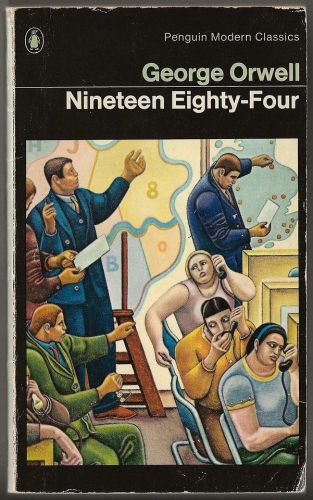 To repeat the obvious, Burnham was describing Communism, not some theoretical “totalitarianism,” as in some press blurbs for Nineteen Eighty-Four. As noted, Orwell explicitly disavowed any connection between his fictional “Party” and the Communist one. Nevertheless, the political program that O’Brien boasts about to Winston Smith is the Communist program à la James Burnham. It’s exaggerated and comically histrionic, but strikes the proper febrile tone.
To repeat the obvious, Burnham was describing Communism, not some theoretical “totalitarianism,” as in some press blurbs for Nineteen Eighty-Four. As noted, Orwell explicitly disavowed any connection between his fictional “Party” and the Communist one. Nevertheless, the political program that O’Brien boasts about to Winston Smith is the Communist program à la James Burnham. It’s exaggerated and comically histrionic, but strikes the proper febrile tone.
First, some O’Brien:
Power is in inflicting pain and humiliation. Power is in tearing human minds to pieces and putting them together again in new shapes of your own choosing. Do you begin to see, then, what kind of world we are creating? It is the exact opposite of the stupid hedonistic Utopias that the old reformers imagined. A world of fear and treachery is torment, a world of trampling and being trampled upon, a world which will grow not less but more merciless as it refines itself. Progress in our world will be progress towards more pain. . . .
The espionage, the betrayals, the arrests, the tortures, the executions, the disappearances will never cease. It will be a world of terror as much as a world of triumph. The more the Party is powerful, the less it will be tolerant: the weaker the opposition, the tighter the despotism.[13] [17]
Now bits of Burnham:
The terror is everywhere, never ceasing, the all-encompassing atmosphere of communism. Every act of life, and of the lives of parents, relatives and friends, from the trivial incidents of childhood to major political decisions, finds its way into the secret and complete files. . . . The forms of the terror cover the full range: from the slightest psychological temptings, to economic pressure . . . to the most extreme physical torture . . .
* * *
It should not be supposed that the terror . . . is a transient phenomenon . . . Terror has always been an essential part of communism, from the pre-revolutionary days . . . into every stage of the development of the communist regime in power. Terror is proved by historical experience to be integral to communism, to be, in fact, the main instrument by which its power is increased and sustained.[14] [18]
Burnham and Orwell were of very different mentalities, the first always gushing theories with the fecundity of a copywriter dashing off taglines; while the second was constitutionally averse to abstractions and hypotheticals, much preferring near-at-hand things, such as the common toad. It’s striking that Orwell could not only find something useful and intriguing in Burnham, he honored him with a few of the most insightful and appreciative critiques.
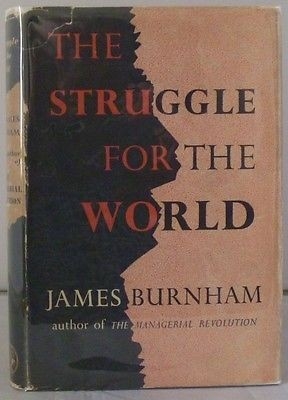 In March 1947, while getting ready to go to Jura and ride the Winston Smith book to the finish even if it killed him (which it did), Orwell wrote his long, penetrating review of The Struggle for the World. He paid some compliments, but also noted some subtle flaws in Burnham’s reasoning. Here he’s talking about Burnham’s willingness to contemplate a preventive war against the USSR:
In March 1947, while getting ready to go to Jura and ride the Winston Smith book to the finish even if it killed him (which it did), Orwell wrote his long, penetrating review of The Struggle for the World. He paid some compliments, but also noted some subtle flaws in Burnham’s reasoning. Here he’s talking about Burnham’s willingness to contemplate a preventive war against the USSR:
[Burnham sees that] appeasement is an unreal policy . . . It is not fashionable to say such things nowadays, and Burnham deserves credit for saying them.
But suppose he is wrong. Suppose the ship is not sinking, only leaking. Suppose that Communism is not yet strong enough to swallow the world and that the danger of war can be staved off for twenty years or more: then we don’t have to accept Burnham’s remedy – or, at least, we don’t have to accept it immediately and without question.[15] [19]
Orwell was just using moderation and common sense here, but what he’s suggesting is what in fact began to happen that year (1947). Instead of the predicted war of destruction; policies of “containment,” “rollback,” “interventions”; defense treaties (NATO); and targeted economic aid (Marshall Plan) might work at least as effectively against the Soviets, as well as being far pleasanter and more manageable.
Ironically, Orwell did not pay much attention to what was going on in the outside world that year or next; he had bigger things to worry about. But as the world moved on, it diverged more and more from the fundamental premises of Nineteen Eighty-Four. There wouldn’t be an “atomic war” in 1950 (war, yes; not atomic) and Soviet-style terror regimes weren’t going to swallow all of Europe, however likely that looked in the spring of 1947.
Notes
[1] [20] The actual title of the book on publication date was Nineteen Eighty-Four in London (Secker & Warburg) on June 8, 1949; and 1984 on June 13, 1949 in New York (Harcourt Brace). Orwell and his publisher slightly preferred the numerals, but chose to go with the words for the London edition. Orwell used both styles interchangeably – obviously one is more convenient to type. (George Orwell: A Life in Letters, Ed. Peter Davison [London: W.W. Norton], 2010.)
[2] [21] Cyril Connolly, “Year Nine,” collected in The Condemned Playground (London: Routledge, 1945), originally published in The New Statesman, January 1938. Connolly was inspired by a visit to the “Degenerate Art” exhibition in Munich, where he got the uneasy sense he was expected to leer with a disapproving expression.
[3] [22] Clive Fisher, Cyril Connolly (New York: St. Martin’s Press, 1995).
[4] [23] Connolly, The Condemned Playground.
[5] [24] Connolly, The Condemned Playground.
[6] [25] George Orwell, “Such, Such Were the Joys,” Partisan Review, Vol. 19, No. 5 (New York), Sept.-Oct. 1952.
[7] [26] Paul Owen, “1984 thoughtcrime? Does it matter that George Orwell pinched the plot? [27]”, The Guardian, 8 June 2009.
[8] [28] E. (or Y.) Zamyatin, We, tr. Gregory Zilboorg (New York: E. P. Dutton), 1924. This English-language edition was actually the first publication of We.
[9] [29] George Orwell, review of We, Tribune (London), January 4, 1946.
[10] [30] George Orwell, Keep the Aspidistra Flying, many editions. Originally: London: Victor Gollancz Ltd., 1936.
[11] [31] James Burnham, The Managerial Revolution (New York: John Day, 1941).
[12] [32] James Burnham, The Struggle for the World (New York: John Day, 1947).
[13] [33] Nineteen Eighty-Four, Part III, iii.
[14] [34] James Burnham, The Struggle for the World (New York: John Day, 1947).
[15] [35] George Orwell, “James Burnham’s view of the contemporary world struggle,” New Leader (New York), March 29, 1947.



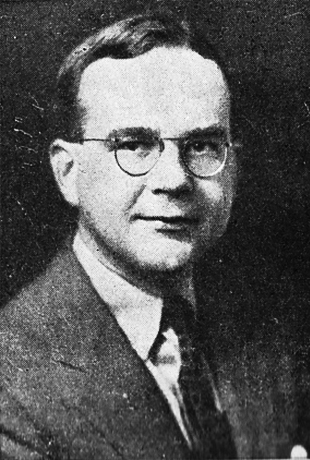
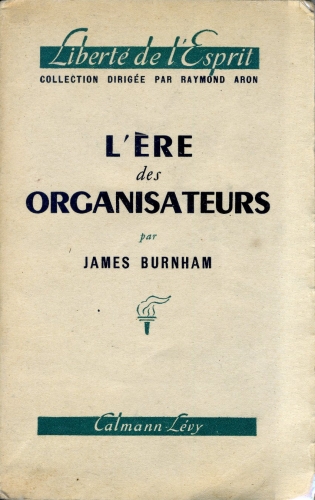
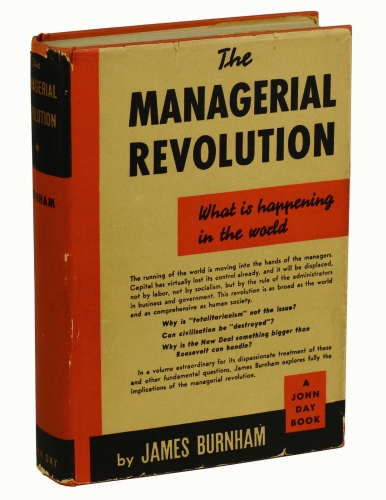
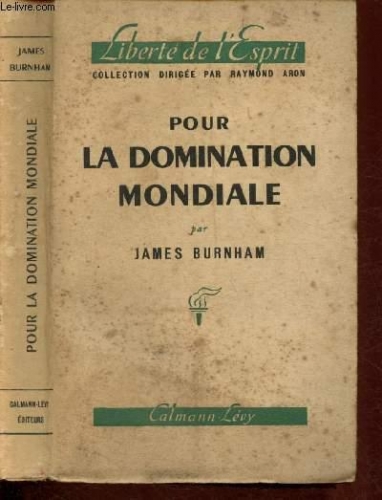
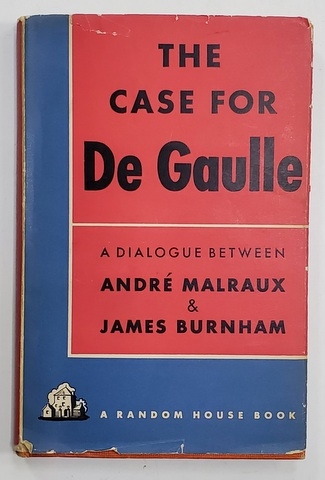
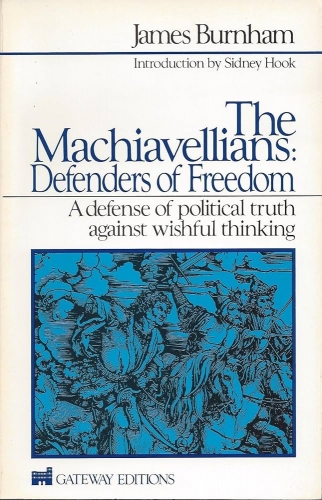

 del.icio.us
del.icio.us
 Digg
Digg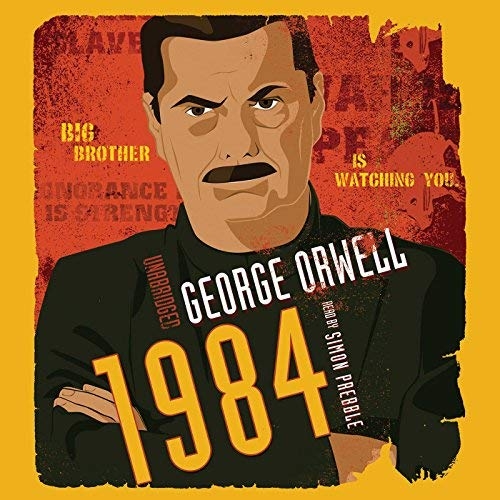
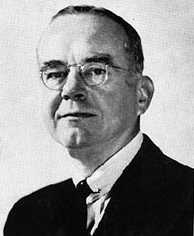 It is not enough to view intellectuals as the makers of political change through their transmutation of culture. It is also necessary to consider the state and the elite who will rule it. Politics becomes impossible to conduct without the type of hardworking, ruthless, and ambitious people who generally make up the political class.
It is not enough to view intellectuals as the makers of political change through their transmutation of culture. It is also necessary to consider the state and the elite who will rule it. Politics becomes impossible to conduct without the type of hardworking, ruthless, and ambitious people who generally make up the political class.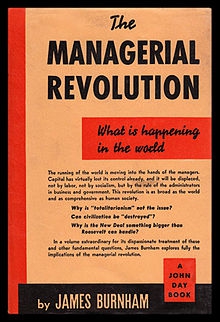 His books of greatst interest are The Machiavellians and The Managerial Revolution. The first one is mainly about the political theories of a number of thinkers who Burnham considered to be a part of what he called the Machiavellian tradition. The main argument of the book is that politics, defined as a struggle for power, can never be removed from human existence. In every society, there must be one group of people who rule, and one group who is the subject of that rule. In the second book, Burnham makes the case that a revolution is well under way, but not the type of revolution which is often advocated by the Left. The managerial revolution is taking place within the bureaucracy of the modern state, and is the revolution of the managers, at the expense of other forms of leadership.
His books of greatst interest are The Machiavellians and The Managerial Revolution. The first one is mainly about the political theories of a number of thinkers who Burnham considered to be a part of what he called the Machiavellian tradition. The main argument of the book is that politics, defined as a struggle for power, can never be removed from human existence. In every society, there must be one group of people who rule, and one group who is the subject of that rule. In the second book, Burnham makes the case that a revolution is well under way, but not the type of revolution which is often advocated by the Left. The managerial revolution is taking place within the bureaucracy of the modern state, and is the revolution of the managers, at the expense of other forms of leadership. When it comes to Dante, Burnham goes on to place his seemingly independent normative principles in their proper context. He shows that Dante had been involved in an extensive and lengthy conflict between the Ghibelline and the Guelph factions. Dante and the faction to which he belonged lost to their rivals, and he went to the Holy Roman Emperor to ask for his support. When these facts were presented, it became quite clear that Dante had put forward his principles with the hope of winning the good graces of the Emperor, and thus attempted to justify his rule. That is the true meaning of De Monarchia, as Burnham sees it.
When it comes to Dante, Burnham goes on to place his seemingly independent normative principles in their proper context. He shows that Dante had been involved in an extensive and lengthy conflict between the Ghibelline and the Guelph factions. Dante and the faction to which he belonged lost to their rivals, and he went to the Holy Roman Emperor to ask for his support. When these facts were presented, it became quite clear that Dante had put forward his principles with the hope of winning the good graces of the Emperor, and thus attempted to justify his rule. That is the true meaning of De Monarchia, as Burnham sees it.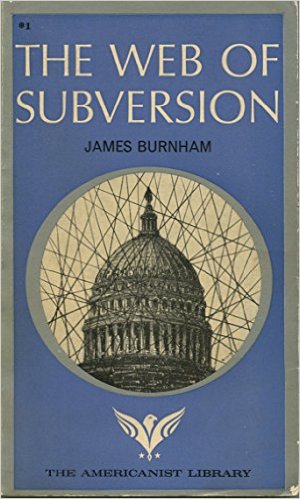 It is important not to overlook the importance of the managerial state, and the importance of the state in general. It is not enough to merely philosophise; there needs to be a political elite and a physical structure which underpins this elite. We can take Sweden as an example. Sweden took a turn toward the Left during the 1960s and never really recuperated. This was not achieved solely through the work of intellectuals and Leftist philosophical theories. What happened in addition to this was that a large number of people were recruited to work as functionaries and civil servants in the ever-growing state machinery. Social workers, teachers, and administrators were recruited and formed a bureaucracy the like of which Sweden had never experienced before. They became the new class of managers. Regardless of what kind of government gets elected, this establishment stays more or less the same.
It is important not to overlook the importance of the managerial state, and the importance of the state in general. It is not enough to merely philosophise; there needs to be a political elite and a physical structure which underpins this elite. We can take Sweden as an example. Sweden took a turn toward the Left during the 1960s and never really recuperated. This was not achieved solely through the work of intellectuals and Leftist philosophical theories. What happened in addition to this was that a large number of people were recruited to work as functionaries and civil servants in the ever-growing state machinery. Social workers, teachers, and administrators were recruited and formed a bureaucracy the like of which Sweden had never experienced before. They became the new class of managers. Regardless of what kind of government gets elected, this establishment stays more or less the same.